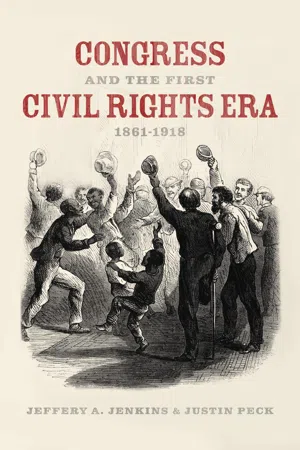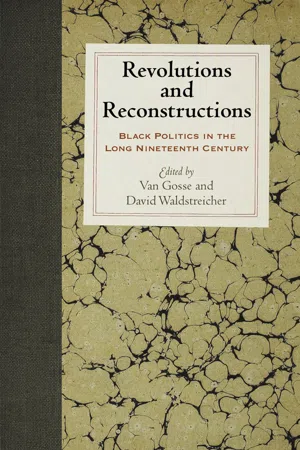Compromise of 1877
The Compromise of 1877 was a political agreement that effectively ended the Reconstruction era in the United States. It involved the withdrawal of federal troops from the South, effectively ending Reconstruction, and the appointment of a Southern Democrat to the president's cabinet. In exchange, the Republicans gained support for Rutherford B. Hayes as president. This compromise marked the beginning of the Jim Crow era in the South.
4 Key excerpts on "Compromise of 1877"
- eBook - ePub
Teachers' Guide to Land of Hope
An Invitation to the Great American Story
- Wilfred M. McClay, McBride(Authors)
- 2020(Publication Date)
- Encounter Books(Publisher)
...In 1873, a business panic set in, producing a deep economic depression and distracting many Americans from the failing condition of Reconstruction in the South. The final blow to Reconstruction came during the 1876 presidential election, one of the most corrupt and controverted in American history. The Republicans nominated Rutherford B. Hayes, and the Democrats nominated Samuel J. Tilden. Neither candidate supported the Radical agenda, and both were lenient in their approach to the South. When the electoral votes were inconclusive, Congress set up an electoral commission to decide the outcome. The Compromise of 1877 was worked out between the Republicans and a group of southern Democrats who were willing to defect if the Republicans promised that Hayes, if president, would withdraw the last federal troops from the South and allow the last two Republican state governments (Louisiana and South Carolina) to collapse and commit to the construction of a southern transcontinental railroad. In return, the Democrats would drop their opposition to Hayes and would accept the three Reconstruction amendments to the Constitution (the Thirteenth, Fourteenth, and Fifteenth). In the end, Hayes became president, and the Compromise of 1877 marked an inglorious end to the Reconstruction era – with much left undone and a great many gaping wounds remaining unhealed. Questions and Answers 1. What was the condition of the South when the war ended? What was the situation of the freedmen? (pp. 190–91) The South was devastated: railroads and cities were destroyed, and a quarter of a million men were dead. The freedmen were jubilant but had nowhere to go; “he was free from the old plantation,” wrote Frederick Douglass of the liberated slave, “but he had nothing but the dusty road under his feet.” 2. How had the North fared during the war? Why? (pp...
- eBook - ePub
- John David Smith(Author)
- 2016(Publication Date)
- The Kent State University Press(Publisher)
...Vann Woodward, Reunion and Reaction: The Compromise of 1877 and the End of Reconstruction (Boston: Little, Brown, 1951). 16. Heather Cox Richardson provides a good gloss of the postwar debate over the economic platform of the Radicals in The Death of Reconstruction: Race, Labor, and Politics in the Post–Civil War North, 1865–1901 (Cambridge, Mass.: Harvard Univ. Press, 2001), 254n16. See also Kenneth Stampp, The Peculiar Institution: Slavery in the Antebellum South (New York: Knopf, 1956). 17. Bernard Weisberger, “The Dark and Bloody Ground of Reconstruction Historiography,” Journal of Southern History 25 (Nov. 1959): 433n23. 18. Eric McKitrick, Andrew Johnson and Reconstruction, (1960; repr., New York: Oxford Univ. Press, 1988), 14. 19. Ibid., 66, 85–91. 20. Ibid., 19n6, 20–21, 28–31, 40–41,47, 184–5, 260–67, 276, 279, 298, 329. 21. Ibid., 10, 28–31, 40–41, 172–73, 206, 211, 357. 22. See William B. Hesseltine, review of Andrew Johnson and Reconstruction, by Eric McKitrick, Journal of Southern History 27 (Feb. 1961): 110–11. 23. Michael Perman, Reunion without Compromise: The South and Reconstruction, 1865–1868 (New York: Cambridge Univ. Press, 1973), 10, 12 24. The southern refusal to accept—or even recognize—defeat has received its fullest scholarly treatment in Phillips, Diehard Rebels. 25. Perman, Reunion without Compromise, 93, 347, 154–55. 26. Ibid., 8–10, 12, 14, 347. 27. An interesting comparison might be made here to another influential study that argued, in the aftermath of the 1960s and Watergate, that politics was the problem. See Michael Holt’s The Political Crisis of the 1850s (New York: Wiley, 1978). 28. Dan T. Carter, When the War Was Over: The Failure of Self-Reconstruction in the South, 1865–1867 (Baton Rouge: Louisiana State Univ. Press, 1985), 147–75. See also Eric Foner’s review of Carter’s work in Georgia Historical Quarterly 69 (June 1985): 258–61. 29...
- Jeffery A. Jenkins, Justin Peck(Authors)
- 2021(Publication Date)
- University of Chicago Press(Publisher)
...With these electoral votes in hand, Hayes had a one-vote majority. Democrats cried foul, and rival political actors in the three Southern states moved to certify results that would award the disputed electoral votes to Tilden. To settle the crisis, Congress set up a fifteen-member Electoral Commission to investigate and render a decision, and the eventual outcome favored Hayes 8-7. Underlying the process of dispute settlement was a range of backdoor politicking, which culminated in the (so-called) Compromise of 1877. 217 The negotiations underlying the compromise were secret, but ultimately the Democrats acquiesced to Hayes’s election in exchange for assurances from Republicans that (among other things) they would no longer use the army to prop up GOP governments in the three remaining unredeemed states and instead would allow “home rule.” 218 Subsequent behavior by Grant and Hayes was consistent with Republican leaders’ keeping up their end of the deal. 219 Thus, by late April 1877 the entire former Confederate South had been “redeemed” by Southern Democrats, and the GOP’s ambitious policy of Reconstruction had effectively come to an end. 220 National Republican leaders would continue to hold out (some) hope for a viable Southern wing for the better part of the next two decades, but little would be achieved to make that a reality. Conclusion Since 1865, Republicans in Congress—sometimes with the support of the president and sometimes over his objections—had determined how the country would reconstruct itself and deal with the large population of former slaves. Through these difficult years the GOP successfully passed the Fourteenth and Fifteenth Amendments, the Civil Rights Acts of 1866 and 1875, Military Reconstruction legislation, and five Enforcement Acts. Viewed together, these bills altered the political status of the freedmen and, for a time, bolstered the federal government’s authority to guarantee civil rights to all Americans...
- eBook - ePub
Revolutions and Reconstructions
Black Politics in the Long Nineteenth Century
- Van Gosse, David Waldstreicher, Van Gosse, David Waldstreicher(Authors)
- 2020(Publication Date)
- University of Pennsylvania Press(Publisher)
...CHAPTER 7 “Agitation, Tumult, Violence Will Not Cease” Black Politics and the Compromise of 1850 Andrew Diemer In the summer of 1850, Stephen Douglas guided through Congress a series of bills that quickly came to be known as the “Compromise” bills and have come down to us as the Compromise of 1850. There were, of course, no black members of Congress to vote these bills up or down, and most African Americans lived in parts of the United States where they were denied the right to vote. The Compromise had tremendous consequences for free African Americans, especially the Fugitive Slave Law that in many ways was its core, yet when historians have accounted for the political failure of the Compromise, free African Americans have often played an ambiguous role, or perhaps more precisely they have played a very specific and limited role. In the years following the passage of the Compromise bills, many free blacks rejected the legitimacy of the Fugitive Slave Law and resolved to resist it, by force if necessary. 1 Other African Americans, holding that their native United States no longer afforded them reasonable protections, decided to emigrate across the border into Canada (or to a lesser extent, elsewhere). 2 Both actions can and should be seen as broadly political, yet despite the increasing scholarship that demonstrates the political engagement of free African Americans, many historians, especially those focused on national politics, have continued to depict the period immediately following the passage of the Compromise as a period in which black politics were marginalized. For example, though Sean Wilentz notes that there was a brief backlash in the North to the Fugitive Slave Law, he insists that this backlash quickly subsided. Subsequently, he argues, moderates of both parties came together in order to celebrate the salvation of the Union, and even northerners who were morally troubled by the Fugitive Slave Law saw it as the price of the Union and fell in line...



